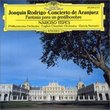| All Artists: Bartok, Pollini, Abbado, Cso Title: Piano Concerti 1 & 2 Members Wishing: 0 Total Copies: 0 Label: Polygram Records Release Date: 10/25/1990 Genre: Classical Styles: Forms & Genres, Concertos, Instruments, Keyboard Number of Discs: 1 SwapaCD Credits: 1 UPC: 028941537126 |
Search - Bartok, Pollini, Abbado :: Piano Concerti 1 & 2
 | Bartok, Pollini, Abbado Piano Concerti 1 & 2 Genre: Classical
Piano Concerti 1 & 2 ASIN: B000001G6E Binding: Audio CD Artist: Bartok, Pollini, Abbado, Cso UPC: 028941537126 |
CD DetailsSynopsis
Product Description Piano Concerti 1 & 2 ASIN: B000001G6E Binding: Audio CD Artist: Bartok, Pollini, Abbado, Cso UPC: 028941537126 Similar CDs
|
CD ReviewsALMOST DAVID BRYSON | Glossop Derbyshire England | 05/04/2004 (4 out of 5 stars) "These concerto performances won The Gramophone's Concerto award in 1979, and it's not hard to hear why. If I stop just short of a fifth star in rating the disc, that's for three reasons. Mainly it's that there is no filler - where has the Stravinsky Petrushka gone to? Secondly the recorded sound seems just a little bit afraid of the orchestra. In the third place I know a version of the first concerto from a rather unexpected quarter that needs the 5-star slot reserved for it even if it does not seem to be in the current catalogues.These concertos call for clean, hard-edged playing, rhythmic incisiveness, unsentimental eloquence, sheer power, intellectual grasp and, in the second concerto particularly, great virtuosity in terms of runs and other kinds of passage-work. Pollini fills that bill fairly exactly, my only reservation in that respect being that since 1979 there seem to be too many others who also fill it for me to even remember their names let alone mention them. The first concerto is very bare and spare, lean and mean. Its themes are fragmentary, its piano writing percussive and uncompromising, there is a lot of percussion work in the orchestra too and the slow movement even has no strings attached. In the second concerto, five years later, Bartok expressed an intention to be less forbidding, a matter about which the liner-note writer voices scepticism. For my part, I'm inclined to go along with the composer's own view. The second concerto is little if at all more lyrical than the first although the nocturne-style slow movement (a Bartok-style nocturne of course, nothing like a Chopin one) is reminiscent of some movements in the quartets, and by these days we ought to be finding the real depth and beauty that used to elude us in such movements when they were still new to us. Where the second concerto has, I should say, more conventional appeal is in a certain Stravinskyish jauntiness in the thematic material, and particularly in the spectacular virtuoso writing for the soloist which ought, in the right hands, to bring the audiences to their feet. The hands of Pollini are still, in an era when the virtuosity that used to belong to just a few is now common property, notably and astoundingly right. His tone as recorded favours him up to a point. The etched, chiselled effect that is inherent in all his playing is obviously right in this context, but it shades into a slightly wiry sound that I'm less comfortable with. Abbado's orchestra is the mighty Chicago, and I would have liked it given a rather fairer share of the limelight. The Chicago band, under Ozawa, also features in a very fine account of the first concerto by Peter Serkin, not in the current catalogues so far as I am aware. The recording is a little reticent, and I wonder whether Serkin himself liked it done this way. I experienced the same feeling with regard to the balance as in his account of the Schoenberg concerto. The whole effect is not the last word in `forwardness' or immediate impact, but what I did catch was more of the alleged influence of the baroque concerto on this work's style. What may come as a surprise to many is that there is also a recording of the first concerto by Mr Serkin's redoubtable father. It is presumably the oldest recording of the three, with Szell and the Columbia, aka Cleveland, SO, but it is distinctly the best. Even more to the point, the performance knocks both his son's and that of his admirer Pollini for a boundary. Rudolf Serkin's style often seems spare and percussive, but in a composition where such adjectives are complimentary his touch easily surpasses the others in quality of tone and sheer `presence'. And in addition, there is that sublime and unapproachable rhythmic instinct, for my money completely unequalled by any piano player I have ever heard. The qualities that in 1979 made Pollini so special are increasingly rained down on us like leaves in Vallombrosa. The qualities that distinguish Rudolf Serkin seem to me more remarkable with every decade that passes."
|

 Track Listings (6) - Disc #1
Track Listings (6) - Disc #1

